Chris Gosling was a DJ (as 'Chris G') on one of the UK's least successful offshore radio ventures. The station, which broadcast as both Tower Radio and Radio Tower, only lasted
a few months at the end of 1965 and beginning of 1966. It was based on Sunk Head fort, a World War II anti-aircraft installation 14 miles off Walton-on-the-Naze, Essex.
On 7th November 2018 Chris was interviewed by Charles Wright of the Felixstowe & Offshore Radio Facebook page. We are very grateful to
Charles and Brian Nichols for allowing us to publish a transcript of their conversation on The Pirate Radio Hall of Fame.
The full recording of the interview is available on Soundcloud.
|

|
| Radio Tower car sticker. |
CHRIS GOSLING: I was an Ipswich boy. I had a generally good family. The family were nice and friendly and cheery as families sometimes were in the past and I think I had a nice childhood. When
I grew up I was a bit uncertain about which direction or what direction to go in and I developed, quite early, some really bad habits - one of those was working in the winter and trying to take the summer off. I succeeded a few
times. I failed a few times but, when I was about 18, I'd just passed my driving test recently and the pirate radio scene was on the go really and occasionally you'd talk to your friends and they'd say “have you heard that
bunch of loonies?” or “have you heard that bunch of loonies?” and a bunch of loonies that was mentioned to me were someone called Tower Radio who broadcast from Sunk Head Tower in the North Sea. I think they were
10 or 11 miles out there - they were quite a long way out on one of the old Maunsell forts. They broadcast pretty regularly. They did reasonable hours, daytime hours essentially, sort of 7 in the morning until 7 or 8 at night,
which I thought was slightly odd but there you go... and one of the things they said at one point was “you can give us a ring. If you are interested in coming and working for us, give us a ring.”
CHARLES WRIGHT: So you actually heard this on air.....
CG: Yes. So I made the phone call.
CW: So what year was this then?

CG: Well I was about 18 so it must be..... a bloody long time ago!..... about '65. I don't know. I am 72 now and I was 18 at the time.
CW: I think I read (on a website) that they took over the fort in about May 1965.
CG: That would be about right. I was 18/19 in 1965. I rang this bloke who turned out to be a man called Eric Sullivan who ran the thing. And he said “come and see me” in Colchester, and he had a little tiny upstairs office
above an estate agent, I think. Trinity Lane I think it was - a little tiny narrow lane with very old buildings - and up I went and we had a chat and he said “well you sound quite good, do you know a bit about music?” I
said “oh yes” and I thought “no I don't”! - and I got the job. I forget what they money was. It wasn't much but I got food and drink - and fags.
CW: So what did the rest of your family or your parents......
CG: They thought I was loopy. I'd just got a note from the police to say “we want to talk to you because you've just driven through a red light” and I thought “well, I am gone” (laughs) so I escaped the criminal
justice system..... I thought “I am gonna do it”. I was also in the running for a job as an assistant manager at the Gaumont cinema in Ipswich so who knows what might have happened.... I just fancied it really because, I
think, when you're 19 years old or 18 years old, you can do the things you fancy - much the same as you can at our age essentially because, once you're a certain age, you can say “I'll go and do that” because it doesn't
matter much to anybody else what you do as long as you're reasonable safe. You don't want your mother crying at night or anything like that.
|
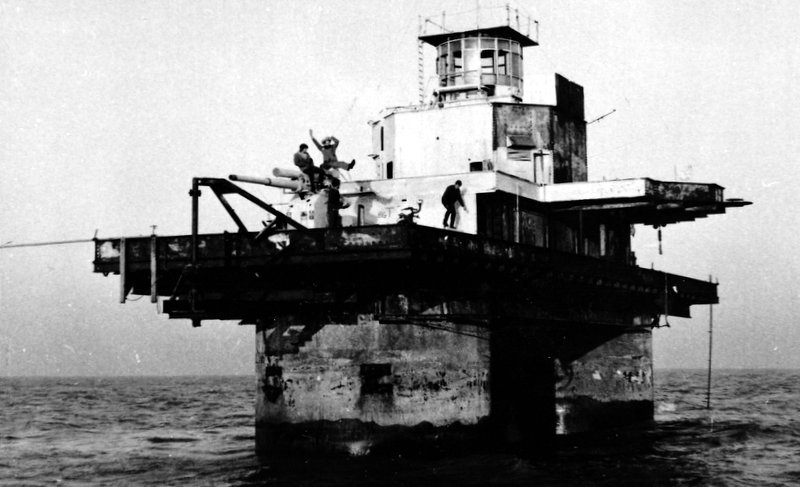
|
| Sunk Head, the home of Tower. Photo published by the Free Radio Association, kindly provided by George Morris. |
CW: So you got the job. Then what happened? Did you go out straight away?
CG: No, we faffed about. That's the phrase I'd use. The people who were involved in the station.... there was Eric who, in inverted commas, owned it; there was a man called George Short who was the techie guy; there was a man called
John Waters who was the Head DJ; there were a couple of riggers who were nice guys - one I've been in touch with recently, a man called John Boulter. He had an oppo whose name I can't remember. But we faffed about for a few days and
then eventually Eric said “well we're going off out tomorrow, and we're going from Harwich”. And we turned up at Harwich, I think it was quite early one morning, and I'd met Eric wherever and gone there and we went into a
place called Gas House Creek - an evocative name - I think it's all been filled-in now - it was right beside the train ferry jetty and there was a man there called Billy Bennett who I will always remember because he was such a
nice bloke. He was a fisherman. He had a very elderly fishing boat - when it was built, God only knows - it was wooden, and he loved it with a passion. He did like it a lot. And Billy was the man. He took us out there. It was quite a
long journey - well it was a couple of hours. The engine had a small conniption but he nipped down and fixed it and, before you knew it, there we were. This damned great thing about 30 feet out of the water. I think it was probably 20
or something - quite a long way up. And we poodled about underneath it for a few minutes and people yelled and shouted a lot. Then they started sending down some ropes. So we put our bags on the ropes and they hauled them up. And a
ladder came over the side. The ladder was a Royal Marine-style boarding ladder which was very narrow. It was about that wide.....
CW: Oh, a nine inch one.
|
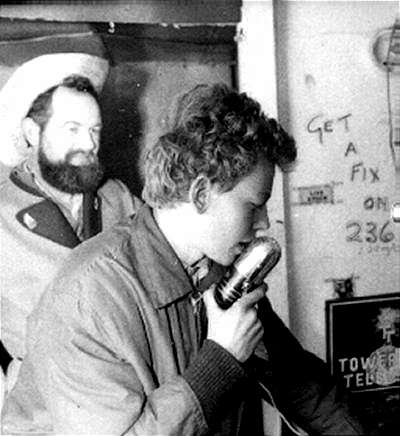
|
| Chris's disc-jockey colleagues on Tower: Bill Rollins, at the microphone, and “Dynamite” Dave Simser, in the hat. Photo taken by Martin
Stevens, provided by Martyn Webster. |
CG: ... and it had individual pins through the running joints. How it joined together, I don't know, but every so often it had some pins so you were advised to take biggish steps and stay clear of those, and at that
point - I am not very good with heights - but at that point you have absolutely no choices whatsoever. You could say “I'm not going up that bloody thing” but, in reality, you went. So I went. And there was me; there was a
guy called Bill Rollins, who is still about; and there was a guy called Dave Simser who, in later days - literally days later - we were calling him “Dynamite
Dave” (laughs). He was a lovely man. He was a very nice man but he was a little bit boring. I don't know if he's still alive. I hope he is, but if he is still alive and I've just called him a little bit boring, he's probably
going to come and smack me in the gob! But he was a nice man.
CW: He was in his late 80s when I last heard of him.....
CG: So I'm probably fairly safe from being smacked in the gob! OK. We all went up there. A couple of the guys - I think John Waters and whoever - came off, and we were up there with the two riggers, John Boulter and his mate, and that
was kind of it. At that point we had a discussion amongst the three of us as to what we were going to do and we worked out a programme schedule of who did what. It ended up with Bill Rollins and I doing most of the work and Dave Simser
doing two hours a day of Country & Western, because he had a huge Country & Western collection which he brought with him. I don't know if it ever got off the tower. I assume it must have done because I can't imagine he would
have left it there. But that was it.
We were there. We were on that bloody tower. 11 miles out in the North Sea; no women in sight for 11 miles in any possible direction; nothing really interesting happening; no effective communication with the land - and that's us.
CW: What were the actual conditions, the living conditions like?
CG: As far as I recall, they were complete crap. We had a little tiny studio which was about, I don't know, 8 ft. by 8 ft., maybe a little bit bigger. It had one big living room and then it had a number of other rooms on that floor
which included a generator space and, er, stuff. And, in effect, we all lived in one room. And it was, as I recall, primitive - extremely primitive, I'd say (laughs). It was quite a strange and entertaining experience.
|
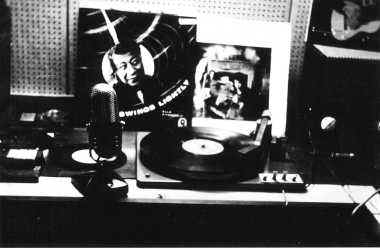
|
| The Tower studio. Photo from ‘Offshore Multimedia’ CD-ROM. |
CW: So did you find yourself getting bored or were there things to be....
CG: No, we had quite an entertaining time between us because we all, with the exception of Dave, we were all young and quite cheery - because you don't do that job unless you are. So we were all relatively friendly, relatively matey
and we had a relatively good time between us. Bill and I did our individual shows so we were on the air 4 or 5 hours a day each. Dave was on for 2 but one of us had to babysit him and run the discs, so we took turns - did an hour each
or whatever. And we did fine. In reality we were working 6 or 7 hours a day, so we were fine. We worked, you had your breaks, you cooked a meal, whatever - I can't remember the meals. I think they must have been fairly horrendous - but
you did what you did. Do bear in mind it's 47 years ago, or whatever it is, so the reality is.... the stuff went on. We were occupied but I don't remember what we were occupied doing. The tower itself was quite entertaining as a place.
CW: There were guns and things to play with.....
CG: Yes, well, there were the remains of guns to play with and if you felt hacked off with the world there was still glazing in the top, the top observation tower, and you could go and sit up there and have a read, or whatever. You
could sit up there and, if you were lucky, you could re-read one of the two copies of Playboy we had on board. The whole thing was primitive; it was amusing; it was entertaining in so far as you were talking to people you had
never met before, you didn't know very well and getting the silly points in conversation but, in general, it was fine as I recall.
CW: How long did you actually last?
CG: Well I was..... We were actually on air, when I was there, for about three or four weeks as I recall and then everything conked out. I think the genny died. I think the radio (transmitter) obviously died and.... I don't know
if the generator died first or the radio (transmitter) died first but one or the other of them died and we ended up off air. The two riggers did their best I'm sure but they weren't electronics guys and so what in effect happened was
we just stopped. That then became a bit boring. There was nothing much to do but it didn't last very long because what happened is Eric came out with Billy and they took Dave off, they took Bill Rollins off, they took both the
riggers off - because they'd been out there for a long time I think - and they said to me “would you stay for a week or two more?” and I said “yeah. I haven't got a problem” and they sent up this other
guy, an Australian, young guy - well he was English but he'd been on the ‘Big Brother’ scheme to Australia. He'd spent a few years there and bloody hated it and came home. I can't remember the man's name. But he came up and he was a
nice guy. We got on fine. But I think we had another three or four weeks on board with nothing at all happening, and we didn't hear from anybody. We had enough food; we had enough water. I think, as I recall, it was quite roughish
conditions, bad conditions, and that Sunk Head tower - the towers were supposed to be empty of everything and the lower parts of the towers, the legs as it were, were supposed to be used as storage facilities and they had a loading
bay at the water's edge - you could park a boat alongside and load stuff aboard - but, of course, the action of the sea had actually opened up those doors and when you got big seas from the north-east, which is where you get big seas
from, they used to break into the legs, so what would happen - this was worrying - what would happen, when you had a really big wind and big seas, the tower would jump. The tower would jump literally.... I don't know, you couldn't
measure the distance - I suppose you could if you were jolly clever. And the whole structure - how many thousand tons were those things? - thousands of tons of concrete, the whole thing jumped - and that was bloody scary. And, from my
point of view, I didn't really have a big problem with it. I'd been a boaty kid all my life - or quite interested in boats - and so I didn't take particular fear from it but I did take the view that one day it might go and I might
be on it. But there you go.
CW: I did read somewhere that the legs were flooded.
CG: Yes, the legs were flooded. The seas actually broke into the tops of them and the additional sea, as it were, made them jump. I suppose from the force of the waves. (Laughs)
CW: Going back to your days of being on the air, did you get any feedback from listeners?
CG: Hardly any because we didn't have any means of communication with shore. So, in reality, I think when we were broadcasting, I think we may have had one visit from the (supply) boat but that would have been it.
CW: To be honest, at that time I was 15 or 16 and I was very into the offshore stations and I liked to tune around the dial to pick up what was going but I have no recollection of picking up, listening to Tower.
I remember Radio Essex and all the others but, whether I just didn't tune in at the right time, you would have thought it (the signal) would have got into Felixstowe alright.
CG: Oh gosh yes. There were always issues with power. I must have been there for 8 or 9 weeks in total. Quite a long time. I've always been quite happy with my own company really, as a lot of us are at times, and I didn't particularly
have a problem and the Aussie boy was much the same. He'd lived in the outback in Australia so he could cope. So we'd eat together and we'd chat and we'd go and wave at the pilot cutter which used to park just beside us when it was
rough weather and stuff like that - and he was just a nice fellow but we didn't spend all day in each other's company. One of us would go and sit somewhere or you'd read the copy of Playboy for the 84th time or whatever. You
know. There was really nothing much to do. You can cope with that if you've got the right turn of mind, which I must have. And I could put up with it. I can't say I enjoyed it but I can put up with it.
|
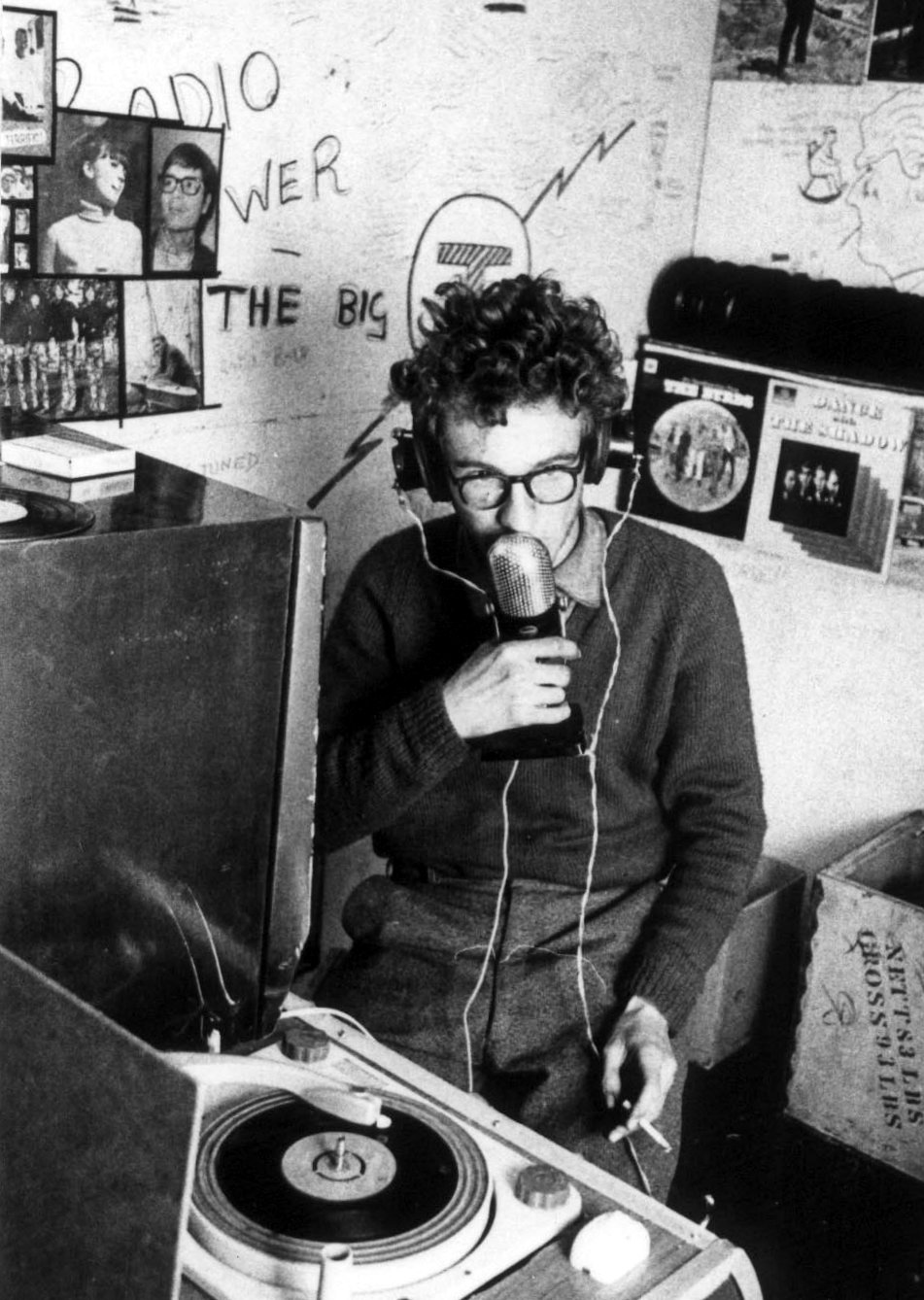
|
| Chris on the air. This photo taken by Martin Stevens and kindly provided by ‘Offshore Echos’. |
And then out of the blue we saw Billy Bennett coming towards us and both of us, like men possessed, threw all our gear into our bags. Nothing had been washed for 9 weeks - including us! And so what happened was Eric and three or four
more guys came out, and these were the guys who were going to mend the radio (transmitter), sort out the generator, because Eric had got access to some money. He'd formed a partnership with a guy who had some dosh apparently, although
I think that was a bit kind of hopeful in later events. So I went ashore. The Aussie boy was asked nicely if he'd stay as he knew the ropes and he said “yes, alright”, and I never saw him again. I am sure he's fine but, you
know, that's what happened. The guys went on board and I went off on the boat with Eric and Billy, and we went home. And Eric said “I can't let you go home like that. Come back to mine.” So we went back to his house, with
his partner Anita who was a really nice woman. He said “I think you ought to have a bath” and I said “yes, I think you are probably right” and I had a bath and I can always remember the water being genuinely
grey. Genuinely grey. And Anita, when I'd got a towel wrapped round me, Anita knocked and said “can I come in?” and I said “yeah” and she said “well the first thing you'd better do then is have a
bath” and I said “what do you mean?” and she said “well you obviously dislodged a lot.... ” (laughs) I was only about 19. You don't care if you're a bit dirty, do you, to be honest? So, at the end of the
day, I had a second bath and the water came out a much paler shade of grey - a lighter shade of grey - and that was the result she was looking for, and she was happy to let me use her sheets (laughs). I stayed there for two or three
days before going home, and then I did quite a lot of little bits and pieces for them. I did some recordings and stuff because they liked the way I sound, which I'm really pleased about. And that really was my pirate story. I forget
why I... (left). I think I just got fed up with it all and said “I've had enough of this”.
CW: So when you'd come ashore and cleaned yourself up....
CG: I spent a few days working for them. I did some recordings for the guy over at Martello Camp at Walton-on-the-Naze. He had a recording studio in the tower and I went and recorded some soundbites for him and some programmes as well.
And that was quite amusing and entertaining.
CW: I suppose none of the audio recordings have survived.
CG: I can't imagine so.
CW: I have heard some off-air recordings - not terribly good quality - mind you I don't think the transmitter was ever....
CG: Oh no, it was rubbish. I am sure it was the cheapest you could get. I think he got it from Canada or something.
CW: I believe, from what I've seen, it was a Canadian World War II transmitter....
CG: Yes, fell off the back of an aeroplane!
CW: .... about 150 watts if you were lucky, which sort of paled into insignificance when compared with the other pirate ships which surrounded you. Could you actually see them from where you were?
CG: No. I think the interesting bit is that he had it all set up to actually go a bit further and then the guy with the money - or the alleged man - sort of disappeared! I think he spent all the alleged money on an office in London
and stuff like that, which is what he wanted to have. So, in reality, a few weeks or months down the line it all disappeared.
CW: Do you have any recollection of Tower Television?
CG: Yes. It never worked. We had a thing (test card) with Tower TV on, and that was about it. I think we had a box with the name on.
CW: It was more to do with getting publicity really.....
CG: Yeah, yeah.
CW: There were one or two articles in the papers of the day.
CG: Yeah. All they were talking about doing, in practical terms, was running old films. It would have been an interesting thing to do but can you imagine....? Television is line of sight broadcasting. Can you imagine the stick you'd
have to have to get that out?
CW: Yes, you'd need a very tall mast.....
CG: Exactly.
CW: ... quite a lot of power just to get to the beach, let alone.....
CG: ...to get anywhere where there's a worthwhile audience. So the reality is it was never going to happen.
CW: There were some rumours which suggested that the government of the day was very, very unhappy with the thought of a TV station. There might have been certain warnings issued. I don't know.
CG: I've no knowledge. I don't know anything about the management of the business at all. But from my point of view, as an 18 or 19 year old bloke with a fairly lively sense of humour, it was a good thing to do. And you learn a bit
and you have a bit of fun doing it, and you walk away and say “thanks very much - that was really interesting”. And that's all you can do. I enjoyed it. I had a great time - in retrospect. I think at the time we were
doing it, it was probably less entertaining and enjoyable - you were stuck miles out in the middle of the bloody sea with nothing happening, with people you hardly knew, and you kind of got on with it because you had no choice. Looking
back on it, I find it all very entertaining. I kept in touch with Eric for - oh, I don't know - years and years, on and off, and he remained the same. He ended up running old people's homes, or nursing homes for people with problems...
he did alright. He was a nice man. When Eric died a few years ago - not that long ago, in the last five or six year - his nephew got in touch with me. It turned out that his nephew was an accountant for the sponsor of a TV programme
I made and that young man wrote to me and said “did you remember Eric?” and I said “very well”. He said “he died”. That's sad. If I'd known I would have gone (to the funeral).
CW: You mentioned Bill Rollins and he is still around and still involved with Radio Caroline and what have you but I take it that, after you tipping your toe in the water of offshore radio, that nothing else
happened subsequent to that.
CG: The reality is that I don't have a great deal of interest in music. Felixstowe Radio will tell you the same thing. I have a good deal of interest in broadcasting; I have a good deal of interest in journalism and writing; but
I don't have a great deal of interest in music. I did a local news show on Felixstowe Radio, which was quite successful I think in some ways, but I didn't like working for Felixstowe Radio very much so I quit. And to me, the music was
essentially something to break up the items, and that's as good as it gets. I mean I like chewing gum for the ears a lot but if it's going to play all day, I'd rather be in another room.
CW: I can see therefore that you were never attracted to go back to any of the other stations.
CG: The money might have been nice, in later days. I guess, when you look at it, in the 80s and 90s and stuff recently, when people have earned pretty mega salaries, you look at it and you think “I could be doing that”
but, in reality, I wouldn't have done it because I wasn't interested in the topic and one thing I have discovered in life is that if you're interested in a topic, you can do it, and, if you're not, you can't - usually.
CW: I presume you are aware that they actually destroyed Sunk Head Tower?
|
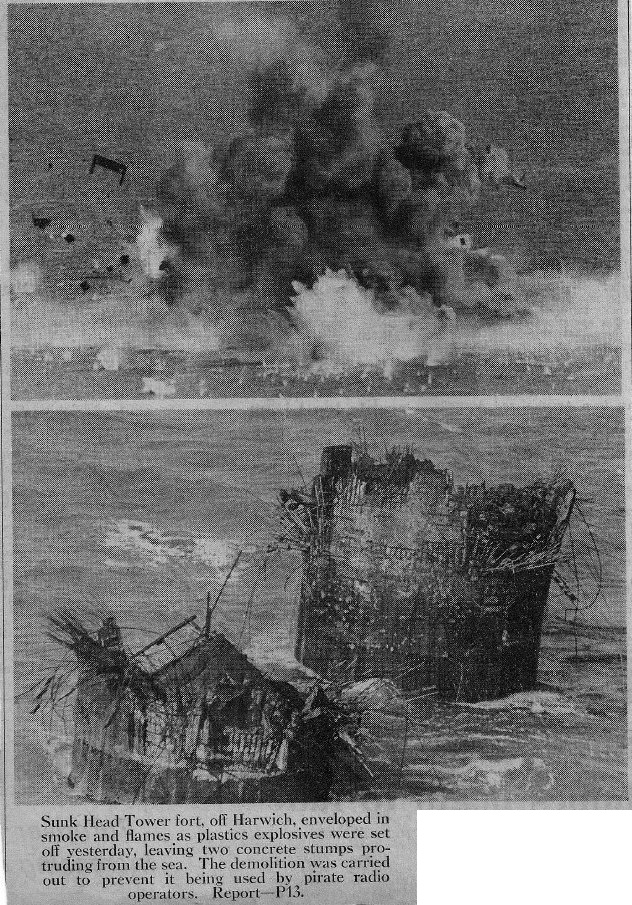
|
| Sunk Head blown up. Cutting from ‘The Daily Telegraph’ kindly provided by Patrick Vienne. |
CG: Blew it up!
CW: In 1967.
CG: I don't blame them really. It was an odd place wasn't it? It would have turned into another Roughs Tower (Sealand) thing at some point, wouldn't it? The only reason the ones in the Thames estuary haven't been done anything with
is because they can prove more or less they're in territorial waters. Or they could jiggle the boundaries so they were. (laughs) I met Roy Bates on a couple of occasions - and his lady wife. He was quite a
nice bloke, I thought. He was a bit determined....
CW: An ex-military man.
CG: Right. He was nice enough to me and his lady wife was charming and gave me lots of tea.
CW: An ex-beauty queen I believe.
CG: She was. She was a nice woman as well but I could never really get what he got out of Roughs Tower. I don't think they got much out of it. They must have got something out of it to have kept doing it.
It was an interesting time to have lived through and, when you look back at it, in all honesty when you look back, you can see what people, in the light of later experience, you can see what people could have done to have made it work
better. Because the trouble is, essentially, the whole pirate radio thing was a lot of fun. It was a lot of fun and the people who did the radio had fun and, even more to the point, the people who ran the operations had fun as well
but quite often they had fun at the expense of the business. I think if there had been people who'd been more determined to make the business work, in a business-like kind of way, they probably would have done a lot better. But who
knows?
|

